Granite Wash Information
What is the Granite Wash?
The Granite Wash (GW) is a tight sand play located in the Texas Panhandle (RRC District 10) and Western Oklahoma. It is a significant field for both oil and gas production and, although the formation is predominantly composed of sand, has been a beneficiary of horizontal drilling methods developed for shale plays. The name Granite Wash is actually a catch-all term that refers to a number of oil and gas producing formations, mostly Pennsylvanian in age. The area covered by the Granite Wash is 160 miles long and 30 miles wide. It varies in depth from 11,000 to 15,400 ft. and is ~3000 ft. thick on average. Productive horizons in the Granite Wash are actually several washes formed by detritus from the Wichita-Amarillo uplift. As a result, stratigraphic nomenclature for productive formations in GW fields varies considerably. A few common names include: The Desmoinesian series, Atokan and Cherokee groups, and the Kansas City group. For tight-gas classification, the Granite Wash-A or Cherokee Marker horizons are commonly used to designate the top of the interval on gamma ray logs. The bottom of the Granite Wash is typically marked by the Thirteen Finger limestone or the top of the Morrow shale.

Since 1993, the Granite Wash has produced 17.2 million BBL of oil and roughly 1.4 billion MCF of natural gas. Production has been steadily increasing in Granite Wash fields since 2004, with over 1.8 million BBLs of oil and 250 million MCF of gas in 2012 as of August. The top oil producing GW fields are Lanthem, Mills Ranch, Merex Resources, Mendota NW., and Bowers. Top gas fields in the GW are Stiles Ranch, Mendota, Red Deer Creek, Mendota NW., West Park, and St. Clair. There are currently over 150 RRC wells in the Granite Wash, additional information for the top-producing wells can be found in the graphs below.
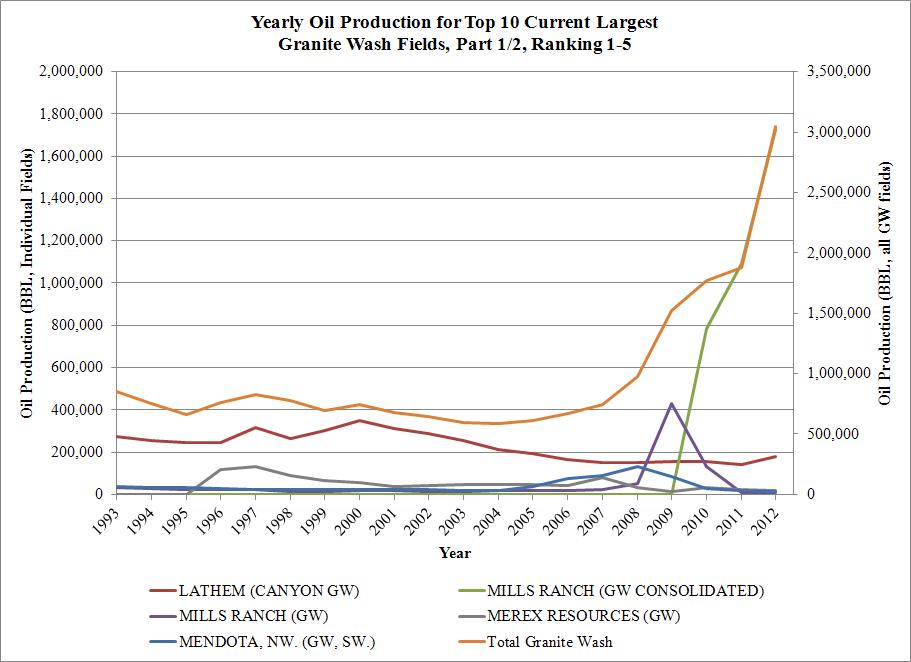
Top 10 highest producing Granite Wash fields for oil production (part 1 of 2) ![]()
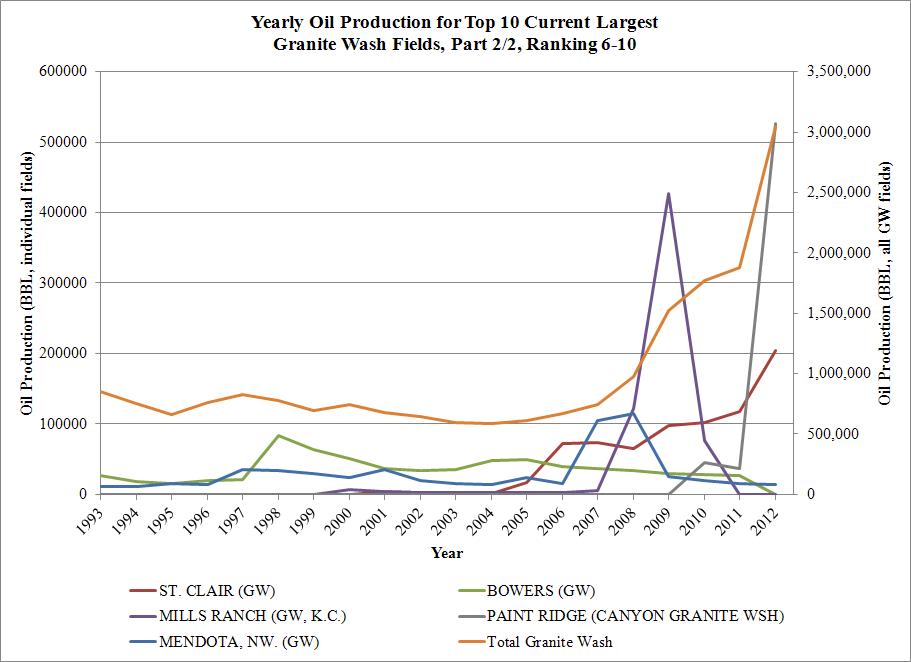
Top 10 highest producing Granite Wash fields for oil production (part 2 of 2) ![]()

Top 10 highest producing Granite Wash fields for condensate production (part 1 of 2) ![]()

Top 10 highest producing Granite Wash fields for condensate production (part 2 of 2) ![]()
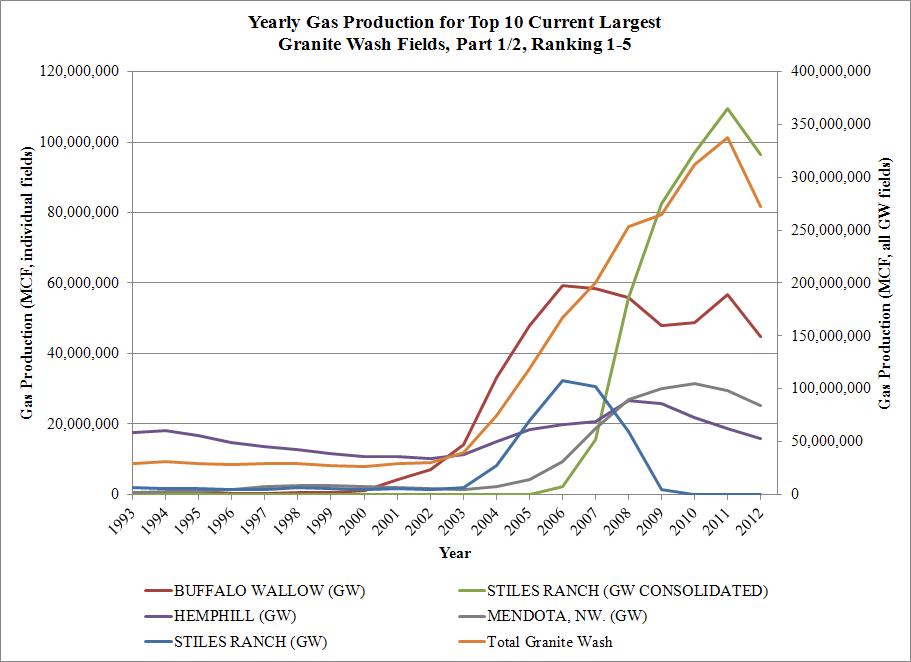
Top 10 highest producing Granite Wash fields for gas well gas production (part 1 of 2) ![]()

Top 10 highest producing Granite Wash fields for gas well gas production (part 2 of 2) ![]()

Top 10 highest producing Granite Wash fields for casinghead gas production (part 1 of 2) ![]()

Top 10 highest producing Granite Wash fields for casinghead gas production (part 2 of 2) ![]()
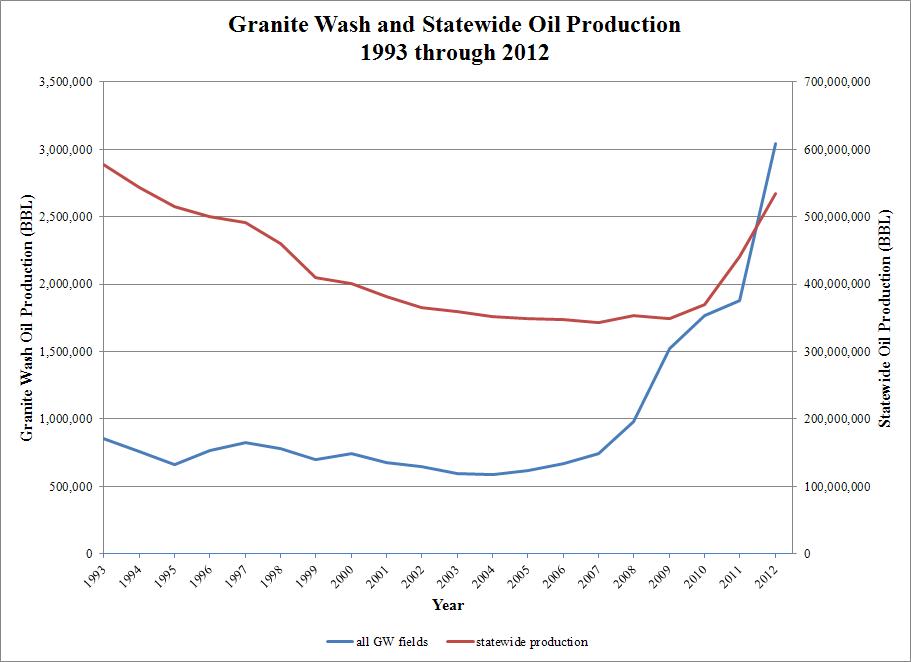
Granite Wash and statewide oil production ![]()
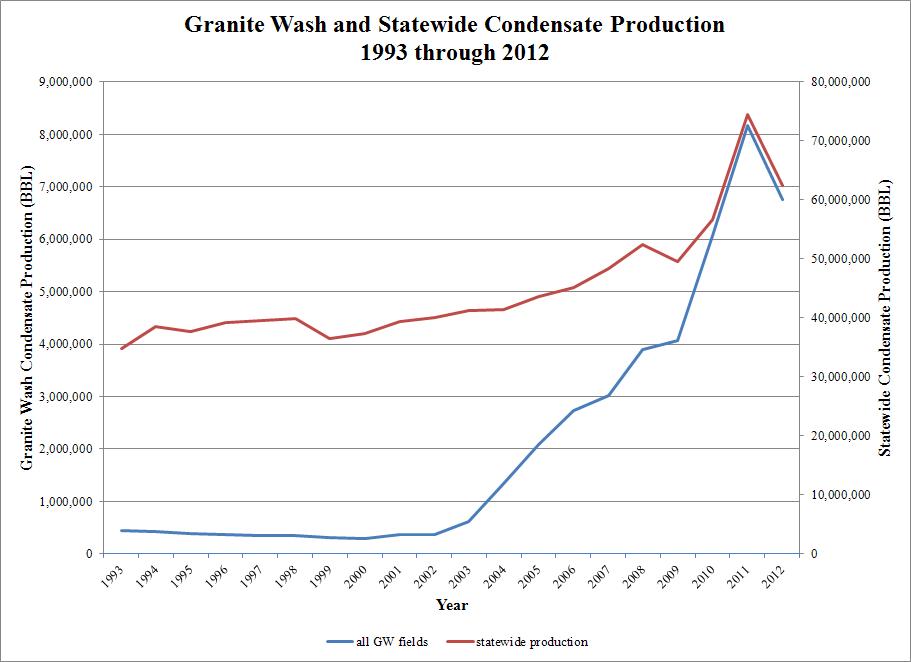
Granite Wash and statewide condensate production ![]()

Granite Wash and statewide gas well gas production ![]()

Granite Wash and statewide casinghead gas production ![]()

Top 10 highest Granite Wash fields by new drilling permit count (part 1 of 2) ![]()

Top 10 highest Granite Wash fields by new drilling permit count (part 2 of 2) ![]()
What does the Railroad Commission have jurisdiction over and whom to contact?
The Railroad Commission regulates the exploration and production of oil and natural gas in Texas. The Commission’s primary responsibilities include: preventing waste of oil and gas resources; protection of surface and subsurface water; and, ensuring all mineral interest owners have an opportunity to develop their fair share of the minerals underlying their property.
The RRC has provided an information page containing links to city, county, state, and federal governments within the Granite Wash area.
For further information, please contact our district offices.
What does the Railroad Commission NOT have jurisdiction over and whom to contact?
The Railroad Commission does not have jurisdiction over roads, traffic, noise, odors, leases, pipeline easements, or royalty payments.
Roads and Traffic: The Railroad Commission does not have jurisdiction over, and exercises no regulatory authority with respect to, private or public roads or road use. Permits issued by the Commission for oil and gas exploration, production, and waste disposal do not limit any independent authority of a municipality, county or other state agencies with respect to road use.
The Texas Department of Transportation (TXDOT) oversees the construction and maintenance of state highways within their jurisdiction. In addition, TXDOT is responsible for issuing access permits to well sites from a roadway on the state highway system. Please review letter for specific access permit requirements. To contact the appropriate district office, please visit the Texas Department of Transportation, Local Information web site. For county or city contact information, please visit the Texas Association of Counties.
Noise: The Commission has no statutory authority over noise or nuisance related issues. Noise and nuisance related issues are governed by local ordinances.
Odors and Air Contaminants: The Railroad Commission does not have regulatory authority over odors or air contaminants. However, for a well within the city limits, the city may enact ordinances regarding odors or other nuisances. In addition, the Texas Commission on Environmental Quality (TCEQ) has jurisdiction over odor and air contaminants. Please see http://www.tceq.state.tx.us/compliance/complaints/odor_complaint.html.
Oil and Gas Exploration and Surface Ownership: For general information pertaining to exploration and surface ownership, please visit the Oil and Gas Exploration and Surface Ownership web page.
Royalty payments: For general information pertaining to leases and royalties, please visit the General Information Pertaining to Leases and Royalties web page.
Faq
Please contact us with comments and suggestions concerning the Granite Wash Information web area.
Last Updated: 6/26/2014 2:40:43 PM


